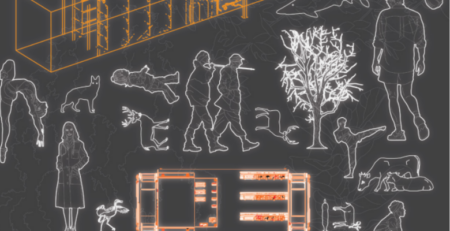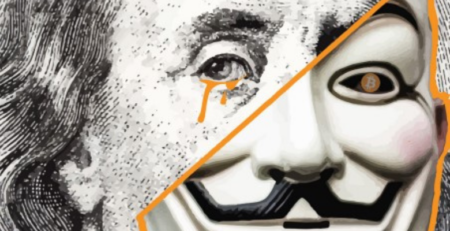Bitcoin’s Peaceful Revolution
A new hope for humanity
Human history is a long battle of centralization vs decentralization, of Power vs People. Our current 400-year golden age began with the decentralization of the printing press, which allowed the people to organize, to battle, then to win fundamental human rights. This victory ushered in the greatest human flourishing since agriculture, perhaps since fire: the liberal revolution, and the industrial revolution that it enabled. But that same printing press was misused by governments to seize the upper hand once more by seizing money. That power now threatens to plunge humanity back to the dark ages.
Governments have used fiat money to step-by-step seize our fundamental liberties, then our prosperity, in a process that is now accelerating alarmingly. The empire struck back most dramatically with government money’s first modern war, World War I, which inflicted a “Wartime Socialism” that was never dislodged, rather metastasized to the point it now threatens to return us to the brutal poverty that have characterized the vast majority of human history.
Most assume our only hope is a political backlash that, historically, has not been peaceful. But there is another peaceful way that strikes at the heart of what drives this creeping totalitarianism: fiat money. Bitcoin’s decentralization of money, its decentralization of the human interactions and organization that money enables, is our best hope to win the war for liberty without ever firing a shot.
A New Hope
The year is 2038. Little Satoshi runs home to give Dad his birthday present: a vintage Blockclock. Satoshi got it as a gag gift since Dad keeps going on about his memes winning the money wars back in the 20’s. Blockclocks are going for 99sats on eBay – cheaper since the dollar died, but a little pricey this year for the White Paper’s 30th anniversary.
What does life look like for Satoshi and his battle-hardened meme-smith Dad? You buy what you like with Bitcoin, instantly, without governments having a say. Unfashionable industries like ammunition, porn, coal, raw milk, or unapproved medicines are all at your fingertips. You pay near-nothing in fees, you don’t wait days for your money. You keep your savings in your own wallet, they grow year-to-year. You don’t ask, you don’t tell.
Pick up a newspaper and it’s a whole different world. There are no more business cycles, because governments are out of the money business. This means an end to the decadal crises that ratchet up the state, from the “dot com crash” in 2001 to the “financial crisis” in 2008 to the catastrophe in 2020. Without that permanent threat of worldwide crash, the financial pages aren’t what they used to be: No more Jim Cramer’s hyperventilating about “growth vs value” or hedging the next disaster that everybody knows is coming.
Instead, financial news is focused on what products are selling and what new inventions come along. In fact, Wall Street isn’t what it used to be — without subsidized debt and permanent bailouts from central banks, it returns to the boring, traditional role of banking: low-risk loans to households or small businesses. Rather than leveraging 0% money to sling trillions at an endless parade of government-fueled bubbles. Nobody obsesses about banks’ health or solvency – no stress-tests in the headlines. Because banks are no longer systemically important. They’re the same as any other group of investors: if they go under it’s their own problem.
The biggest difference in financial news is the Fed. In 2035 nobody cares what Jerome Powell had for breakfast, because Powell’s kind have useful jobs doing bookkeeping at machine tool workshops in Tulsa. The Federal Reserve building, recall, was auctioned off as a burlesque venue – their fortnightly “open market” shows with the donkey are particularly popular.
Beyond the recycled Fed, our government is smaller across the board, tightened to doing more of what’s actually useful. Going by history, it contracted by 80% or more — 5 times smaller — when it lost the dollar. This is why our troops are home working real jobs rather than shooting foreigners or standing guard for the empire. Governments still run deficits in 2038, as they did under gold — politicians are irresponsible by nature — but much smaller now that they have to sell Bitcoin bonds to willing buyers rather than printing monopoly money.
In daily life, perhaps the biggest change is the end of inflation. Stuff gets slightly cheaper every year while Bitcoin gets slightly more valuable every year. Perhaps 5% or so annual, reflecting economic growth and a still-growing population. Things cost less tomorrow than they did today, unlike the dollar days. The evening business news no longer obsesses about inflation rates, or worries about the stagflation it can bring. Senior citizens are no longer forced to gamble in stock markets, because their bank accounts actually pay a living interest rate. Businesses have an easier time making plans and getting their company off the ground.
Finally, the culture. Without permanent crises, without permanently subsidized debt, without a permanently growing government, worldwide cultures shift toward more freedom and prudence rather than the hyperactive short-term obsession of the fiat era. The arts, music, architecture, and lifestyle choices settle towards a more traditional, more solid, more respectable ethos, rather than the witless chaos, destruction, and “action for action’s sake” of the fiat era.
From Here to There
Returning to 2021, today a historical concept that has suddenly become relevant is the 4-stage cycle of civilizational rise and fall. An iconic version runs “good times create weak men, weak men create bad times, bad times create strong men, strong men create good times.” The formula actually dates to at least Polybius’ Histories, written in the 2nd century BC, where he calls it “anakyklosis” – “repeating cycle.”
The process itself is intuitive: creation creates complacency, complacency destroys. But the key unknown is the timing: we don’t know how long each stage lasts.
After all, there have been many eras of “second winds” that stopped or reversed decline, from Caesar Augustus’ restoration to Andrew Jackson killing central banks to Warren G Harding’s half-won “return to normalcy” after the totalitarian World War I.
On the other hand, potential reversals often never happen: President Eisenhower lacked the understanding to reverse FDR’s socialist revolution, instead “baking it in” as party control solidified the “New Normal.”
So even if we know we’re in the decline stage of kyklos, we don’t know how fast or slow it will be, and we don’t know whether we can stretch it out or reverse it. These past 2 years since Covid certainly seem to have rapidly accelerated the decline, as even supposedly liberal governments now lurch to a totalitarianism not seen in the West since the 1930’s and our economy, currently floating on money-printing life-support, increasingly looks like it may have been mortally wounded during the epically misguided lockdowns over these past 2 years. While the Trump saga has led many to conclude that stopping, nevermind reversing, the decline is hopeless.
Indeed, there is a theory called “accelerationism” that maintains we actually want decline to go faster. Because speed engages the immune system of the people to fight back. Like Aesop’s frog in the boiling pot, rapid decline “wakes” enough people to the bullshit that they mentally cross the Rubicon. The individual tipping point could be any small thing: what their kids are being taught in school, empty grocery shelves, not being able to visit a dying relative, losing one’s job over a mandate. Once these events click, like pulling a loose thread on a sweater, people go on to question the entire narrative – they “red pill,” they follow the rabbit.
Unfortunately, “waking up” is only the beginning when stopping the decline. Because the next question is how, precisely, people fight back. If elections are unreliable, either for censorship or ballot-stuffing, then there is only one avenue left: violence. Historically, indeed, many kyklos do reach that stage of widespread violence – the French Revolution being one of the most iconic, and most bloody, examples.
Of course, that’s not yet guaranteed today; elections are still contested, even if one side has an advantage. And if things get bad enough, if the boil gets loud enough that red pills cascade, even ballot stuffers abandon ship as surely as King Louis XVI’s elite soldiers in Revolutionary Paris.
Still, there is potentially a lot of blood between here and there, and a lot of innocent victims caught in-between. Moreover, we certainly can’t be assured that the forces of light and liberty will prevail.
Dark times, but now let’s talk solutions.
What would be super is if we had some peaceful mechanism that reduces the threat at the source. Something that cuts off governments’ ability to seize resources arbitrarily, to launch permanent crises, and to drain our wealth to weaponize against us. And that something is Bitcoin.
By cutting off the totalitarian threat at the source, rather than trying to stomp out its tentacles one by one, Bitcoin is an end-run around politics, an end-run around the bloodshed that Polybius’ anakyklosis has historically entailed. It precisely cures the disease without amputating.
Bitcoin as a technology can give us that “return to normalcy,” indeed it can rewind us to an earlier, gold standard, age before the socialist decline set in. Before FDR and Nixon seized the money, before central banks cartelized the global economy, before socialism plunged the West from classical liberalism to government control.
By taking away their printing presses, Bitcoin stops the creeping totalitarianism that weaponizes our own blood, sweat and tears against us. It stops governments’ escalating ability to control all person-to-person exchange, their efforts to build a financial panopticon of Big Brother control. And, finally, by getting governments out of the business of manipulating money, Bitcoin brings us a world without permanent crisis, without the boom-bust business cycles, without the inflation that ravages the people who those governments pretend to serve and love.
Bitcoin is the one tool that liberates us from government without firing a shot. Indeed, they should be welcoming Bitcoin, because they certainly won’t like the alternative.
Bitcoin as Gutenberg 2.0
This is not the first time a technology changed the kyklos. In fact, liberalism itself, the most fundamental political fact of our age and the most significant political change since agriculture, came from a very mundane technology: the printing press.
Imported from China in the 1400’s, the printing press made it cheap to communicate and disseminate knowledge – previously monks would hand-copy documents in beautiful, ornate script that took a lot of resources that were unavailable to commoners. Movable type reduced these costs thousands-fold.
The very first application of the new press was printing Bibles, which was ironically deeply revolutionary in an era when government-allied churches claimed a monopoly on information: if you like Big Tech censors today, you’d love the Catholic Church of the early 1400’s.
Almost immediately, and related, the new printing press was applied to explicitly political content, printing the pamphlets that launched peasant revolts across Europe. Revolts that didn’t end until negotiated settlements guaranteed limited governments forced to protect property rights, from which flow all fundamental human rights.
Those rights and limited governments, in turn, enabled the classical liberal revolution in science, then in industry and commerce, that gave us the modern world.
The key in Gutenberg’s Press, as in Bitcoin, was decentralization: the printing press allowed cheap dissemination of information, that information allowed cheap coordination without the need for a central authority. This allowed commoners to organize in large enough numbers that they could overwhelm the centralized militaries that governments then, as today, needed.
Before movable type, those centralized militaries could outfight a much larger population that lacked the ability to organize, but they could not stand up to a people armed with decentralized technology. Backroom presses could be set up in an afternoon to spread the revolution in the shadows – indeed, they could be set up faster than governments could stamp them out. With movable type you could announce a rally this Sunday, spread the word, and get 10,000 armed peasants faster than armies could even pack their wagons.
As governments’ worlds spun out of their control, they did desperately fight back, ushering in over a century of bloodshed across Europe. But they finally capitulated, making peace with a liberal consensus that property rights, and associated fundamental human rights like speech and religion, would be respected. This consensus ushered in humanity’s greatest flourishing, one that has now spread to most of the world from Japan to Botswana.
The 1800’s were the crowning achievement of this decentralized revolution. Indeed the trajectory in the late 1800’s was such that, had the socialists not seized the money to enable their counter-revolution, we would today have the science-fiction world that utopians dream of.
Alas, the 19th century liberal utopia crashed into flames as governments progressively seized money, enabling the cataclysm of the World Wars. By 1914 every major power was aching for a fight, knowing they could fund it all by printing money — licensed counterfeiting. In the US, progressives machinated for “war socialism,” finally achieving their dreams of state control. They carried this dream into the essentially Communist administration of FDR 15 years later. FDR’s regime brought state control of all production and employment, even censorship enforced by jailtime for political dissent. It was the collapse of classical liberalism, funded and brought to you by governments’ seizure of money-printing.
Even after the war ended, fiat-fueled totalitarianism continued, “baked in” by Eisenhower. As of 2021, two reformist Presidents (Reagan, Trump) had now failed to dislodge it. And now, since Covid, that quasi-permanence has progressed to uncontrolled metastasization, with new restrictions on economy, private life, indeed on fundamental human rights, that were unthinkable just 2 years ago, nevermind 200 years ago.
What has sustained this socialist revolution, from the start as it fuels today, is government control of the money. It enabled the World Wars, it enabled the welfare and regulatory state that half-killed the economic golden goose which classical liberalism won. It enabled permanent wars for a hundred years, and now it enables trillions in tranquilizing lockdown payments so governments can fully seize not just the economy but the entirety of society.
Indeed, governments are now accelerating even their control of the money, seeking a totalitarian panopticon to monitor and control every human interaction. Whether via government “crypto” CBDC’s or cynical tax and terrorism surveillance, the goal is to control and direct the masses raw materials – molded clay — for whatever revolution governments and their ruling activists and media dream up next. This fiat-enabled trinity crush anything they disapprove of as ‘hate speech’ or ‘carbon sin’, aiming for a totalitarianism where anything the state does not like can not exist.
It is in this darkest stage of the novel where Bitcoin enters. Almost miraculously invented on the very eve that totalitarianism took its 2008 lurch, at the very moment we need it most.
What Bitcoin Changes Next
What would a Bitcoin world change, right now? In the short run, governments would have a strong incentive to end lockdowns and terminate voluntary wars – after all, if taxes fall 50% from a lockdown, or if wars are eating up 25% of the budget a government shorn of fiat cannot afford either.
Once governments are forced to choose between wiping out commerce, or invading another Afghanistan, vs paying their own bureaucrats, the bureaucrats will get paid every time. Shorn of their money printers, governments would be forced, kicking and screaming, to do things that actually benefit the people. Not because politicians or bureaucrats are decent people – they are not — but because they need an economy to get taxes, and they need taxes to pay themselves, and their armies. Fewer lockdowns means fewer restrictions, while fewer wars means fewer Patriot Acts. The trend moves back in our favor.
Beyond reigning in government, on a personal level a Bitcoin world we would end inflation and the business cycles almost immediately – perhaps with one last crash for the road to clear out the easy-money detritus central banks are busily spreading today. There will have been a tremendous transfer of resources in the rise of Bitcoin, of course, from late-buying skeptics to early Bitcoiners. This means a lot of twentysomething anarchist millionaires.
Still, we have seen trillion-dollar transfers many times in the past, including fiat’s real estate bubbles or “dot-com” manias, and society goes on. In fact, the trillion-dollar transfers that get riots aren’t the ones that come from smart investing, they’re the ones that come from crony government handouts, like in the 2008 financial crisis. And so, as in previous monetary replacements, as Bitcoin proceeds to displace fiat the holdouts will join one-by-one, cheering on the new money that is now protecting them as well.
Finally, Bitcoin gives us the precise gift that Gutenberg’s press gave us 500 years ago: the ability to coordinate, communicate, organize. This is likely why the elite is so hostile to Bitcoin, and it fundamentally fulfills the original “Cyberpunk” promise of the internet itself: a re-deification of We the Plebes. As Bitcoin is used to run non-money applications on Bitcoin “rails,” from speech to information to permissionless commerce, humanity wrests free of totalitarian command and control. Unlike today’s centralized internet at the mercy of, and therefore enslaved by, totalitarian governments, Bitcoin is the technology that can finish the revolution the internet started.
Finally, what happens if we walk away, if we Bitcoiners leave the miracle to die on the vine? Permacrisis with each episode ratcheting up totalitarianism. We careen towards stagnation, hyperinflation, utter collapse. For the first time in history, potentially worldwide as fiat cancer has spread unlike any threat in history. Without Bitcoin, surveillance, control, and censorship gallop, each escalation reducing our ability to escape. Dissent becomes criminal disinformation, even terrorism, as the system plunges to unsustainable debt and cronyism. As Herbert Stein put it, If something cannot go on forever, it will stop. Far better to stop fiat before fiat stops humanity.
Conclusion
In conclusion, history says blood may be coming. But we have the savior we need: Bitcoin. It is now in our control to head off Ragnorak, to stop and reverse the collapse before it’s too late. Centralization fueled by fiat money is crashing our world, armed with a level of control never before seen. And Satoshi gave us, just in time, the decentralized technology we need to fight that control peacefully. To disarm our oppressors, to end their crises, to protect and sustain the human rights and free markets that guarantee our liberty, indeed our survival. We need to move fast – they are using money printers and centralized finance to consolidate their control, our window is narrowing. While their litany of victims is growing by the day. Only with Bitcoin can we stop it.







